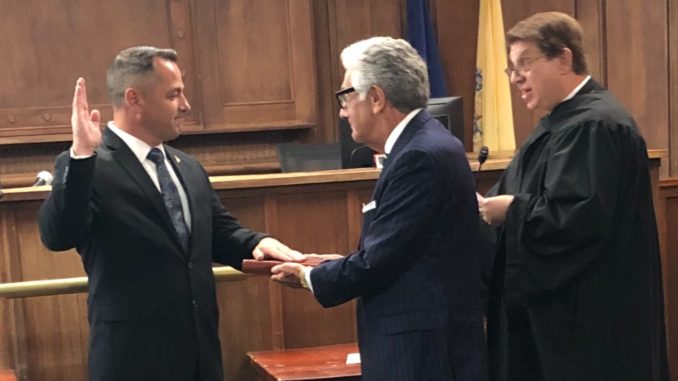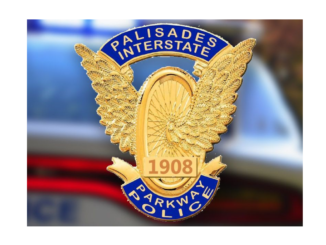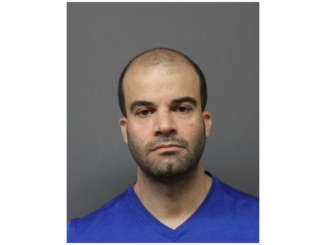
PALISADES INTERSTATE PARK, N.J.—A new police chief selected to run the Palisades Interstate Parkway Police Department—which was under scrutiny much of 2018 following a report of widespread misconduct by officers and its former chief—says the department is better off now and looking to reestablish positive relationships with the public, community leaders and nearby police departments.
“We’re all in it together,” said newly appointed Palisades Interstate Parkway Police Chief Steven Shallop June 26. “It’s all about mending relationships. You cannot do law enforcement all by yourself.”
‘Part of this community’
“All of the police here—we are your neighbors, we’re part of this community. My pet peeve is, to do a better job we need to collectively understand there is a job to be done and these relationships have to be mended,” he added, referring to better relations between the public, community leaders, public officials and neighboring police departments.
Shallop said he believed there was previously “a lack of leadership and direction” at the parkway police department under a prior chief “but the department itself is made up of professional, dedicated employees,” he said.
On April 22, Shallop, a retired New Jersey State Police lieutenant, was selected unanimously by the Palisades Interstate Park Commission to help steer the much-maligned interstate police agency from a period when the agency was taken over by the Bergen County Prosecutor’s Office following the deaths of two individuals involved in police pursuits.
The chief makes $145,000 in his new position. Shallop was with the state police from 1989 through 2018, when he retired.
Shallop, of Flemington, took control of a 30-officer parkway police force, which patrols an 11-mile swath of the Palisades Interstate Parkway between the George Washington Bridge and the New York State line, plus 2,500 acres of Palisades Interstate Park grounds.
Shallop, 54, said his first-year priorities for the department include increasing officer retention; he said 17 officers got training and left the force in a little over three years.
A possible new salary structure for officers may help them compare their salaries to similar police forces, he said, which should increase officer retention. “Constant retraining and turnover does not create stability,” he noted.
The current force consists of 30 officers, including Shallop.
NJ State Police veteran
While with the state police, Shallop served 12 years as a road trooper in various troops and later moved into administrative and supervisory roles, including traffic, community policing, drug awareness and prevention, and supervised multiple training and outreach programs.
He said he wants to change the parkway police department’s policies to follow “best practices” endorsed and approved by the statewide police chiefs association.
Specifically, the policies address use of force, performance evaluations, internal affairs investigations, and police pursuits.
He said he recently got permission to hire a consulting group that has evaluated police departments statewide, and looks at 112 individual policies that may need to be addressed.
Following this evaluation and implementation of appropriate policies, the department may be eligible to receive accreditation, he said.
Monthly monitoring
The new chief said monthly monitoring reports are still being supplied to Bergen County Prosecutor’s Office to update ongong department investigations, arrests, motor-vehicle stops, use-of-force reports and any complaints against officers. He said all vehicles are equipped with dash-cameras to record patrol stops and that he “would not be opposed” to giving officers body-worn cameras.
“I think they’re [cameras] essential for most police departments,” said the chief.
He said more often than not, a review of dash-cam footage or a body camera backs up the officer’s version of an event and offers “credibility” to an officer’s version of events.
The parkway police vehicles record dash-cam video and audio, he said.
Department troubles
The former chief, Michael Coppola, resigned in August 2018 after being caught in a sting trying to purchase cocaine. Prior to that, the former chief had been suspended after the Bergen County Prosecutor’s Office issued a highly critical report alleging multiple improprieties including dangerous high-speed chases and failure to investigate officers accused of misconduct.
The period of turmoil began for the interstate parkway police in November 2017 following an investigation by the Bergen County Prosecutor’s Office after the deaths of two suspects being chased by police.
The BCPO appointed a monitor to retrain officers on attorney general guidelines on when to pursue a suspect during a motor-vehicle pursuit, as well as how and when to conduct a vehicle search.
High-speed chases
Last summer, the Prosecutor’s Office issued a report that provided detailed examples of officer misconduct, noting parkway police broke state policy in 36 of 41 high-speed pursuits since 2014, pointing out in 23 cases that parkway police exceeded 100 mph and 13 times exceeded 120 mph.
Other misconduct and inappropriate police activities included using police vehicles to box in a car; pursuing four suspects into oncoming traffic; wrongly chasing a suspect down a parallel road 10 times; twice damaging a fleeing suspect’s car; wrongly using a roadblock three times, and on seven occasions, using more than two police cars to pursue a vehicle without authorization.
The report provided specific examples of dangerous and misguided police chases, including a parkway police officer blowing through an intersection at over 100 mph and hitting two parked vehicles.
That was one of eight instances in the report where parkway police broke a pursuit policy requiring police vehicles to slow down and cautiously approach intersections.
Another improper tactic the report found parkway police used involved using the Internet to entice low-level drug dealers to meet on property they patrolled.
One attempted drug arrest pursuit led to a 21-year-old Bronx man falling to his death on the Palisades cliffs while he tried to elude police in July 2017. This was one incident the county Prosecutor’s Office investigated and led the BCPO to install a police department monitor in November 2017.
At the time, then-BCPO County Prosecutor Gurbir Grewal said he installed a police department monitor because the department was not following state guidelines, which was later found to be related to two deaths resulting from parkway police pursuits.
In addition, the BCPO report found the parkway police department failed to follow-up and investigate any alleged violations or complaints against officers, and no discipline occurred for any violations BCPO documented, including dozens of unauthorized high-speed pursuits.
Shallop said that a monthly monitoring report to BCPO provides details of any complaints against parkway officers and strengthening internal affairs was another first-year priority.
Other violations cited by BCPO’s report included misuse of police tactics and rewards, specifically incentives to officers who wrote more tickets or made more arrests, including $200 meal allowances, better parking spaces and access to newer police patrol vehicles.
‘A breakdown’ in command
Following the installation of a monitor by BCPO in late 2017 and its subsequent damning report in July 2018, there were calls from legislators and legislation introduced to bring the department under state attorney general control.
State Assemblyman Gordon Johnson—a longtime critic—told Northern Valley Press in July 2018 that the BCPO report found “a breakdown in the chain of command” between a chief and his officers and between Palisades Interstate Park Commission and the chief.
Johnson charged then the commission “does not have the ability to manage this [police department].” The assemblyman pointed out that seven years ago the department was accused of various wrongdoings, including racial profiling and harassing same-sex couples.
“It was obvious then that there was a problem,” he said.
Johnson said at the time he would propose to transfer authority over the PIP police to the state Attorney General or State Police; require the Attorney General to appoint a civilian police director to oversee the police; move the parkway police budget from the state Department of Environmental Protection and put it under the state Attorney General’s Office.
Since his selection, Shallop said he has reached out to Johnson and spoken about the department. The parkway police are based in Alpine.



